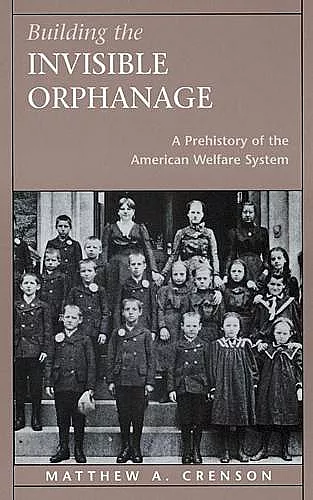Building the Invisible Orphanage
A Prehistory of the American Welfare System
Format:Paperback
Publisher:Harvard University Press
Published:15th Apr '01
Currently unavailable, and unfortunately no date known when it will be back

A valuable book, sure to leave its mark as an important and scholarly examination of the roots of American social policy, not without implication for today. -- Senator Daniel Patrick Moynihan Building the Invisible Orphanage is an extraordinary piece of scholarship. It is based on prodigious research and will doubtless alter debates about the origins and development of the American welfare state. It offers a stiff challenge to prevailing perspectives on the history of welfare in the United States. It will be roundly debated and future scholars will have to reckon with its findings. -- Robert C. Lieberman, Columbia University
This book examines the connection between the decline of the orphanage and the rise of welfare in America. Matthew Crenson argues that the prehistory of the welfare system was played out not on the stage of national politics or class conflict but in the micropolitics of institutional management.
In 1996, America abolished its long-standing welfare system in favor of a new and largely untried public assistance program. Welfare as we knew it arose in turn from a previous generation's rejection of an even earlier system of aid. That generation introduced welfare in order to eliminate orphanages.
This book examines the connection between the decline of the orphanage and the rise of welfare. Matthew Crenson argues that the prehistory of the welfare system was played out not on the stage of national politics or class conflict but in the micropolitics of institutional management. New arrangements for child welfare policy emerged gradually as superintendents, visiting agents, and charity officials responded to the difficulties that they encountered in running orphanages or creating systems that served as alternatives to institutional care.
Crenson also follows the decades-long debate about the relative merits of family care or institutional care for dependent children. Leaving poor children at home with their mothers emerged as the most generally acceptable alternative to the orphanage, along with an ambitious new conception of social reform. Instead of sheltering vulnerable children in institutions designed to transform them into virtuous citizens, the reformers of the Progressive era tried to integrate poor children into the larger society, while protecting them from its perils.
The virtue of Crenson's book is that it is a close examination of the sea change that brought the welfare system into existence in the first place. -- David Warsh * Boston Globe *
A valuable book, sure to leave its mark as an important and scholarly examination of the roots of American social policy, not without implication for today. -- Senator Daniel Patrick Moynihan
Building the Invisible Orphanage is an extraordinary piece of scholarship. It is based on prodigious research and will doubtless alter debates about the origins and development of the American welfare state. It offers a stiff challenge to prevailing perspectives on the history of welfare in the United States. It will be roundly debated and future scholars will have to reckon with its findings. -- Robert C. Lieberman, Columbia University
- Nominated for Allan Sharlin Memorial Award 2000
ISBN: 9780674005549
Dimensions: unknown
Weight: 476g
400 pages